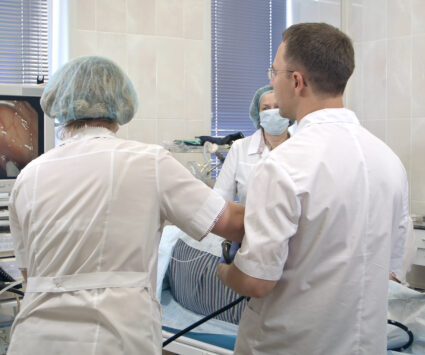A colonoscopy isn’t on anyone’s list of favorite things to do, but this procedure can save your life. What is the purpose of a colonoscopy? It can detect early-stage colon cancer before it becomes life-threatening. According to the National Cancer Institute, 149,500 new cases of colon cancer were diagnosed in 2021. The estimated number of colon cancer deaths was 52,980. Approximately 4% of men and women are diagnosed with colorectal cancer in their lifetimes.
What Is the Purpose of a Colonoscopy?
The purpose of a colonoscopy is detecting polyps, bleeding and other abnormalities in the colon. Polyps are cell clumps lining the colon. While many are benign, some of these growths may later become malignant, or cancerous.
Abnormal cells take between 10 and 15 years to become polyps. Anyone can develop them. With regular screening, doctors find polyps at their earliest stages. This allows for removal before they become cancerous.
Colonoscopies are also performed on patients experiencing certain gastrointestinal symptoms. These may include bowel habit changes, rectal bleeding or abdominal pain.
What Is a Colonoscopy Procedure?
While done on an outpatient basis, a colonoscopy requires patient sedation. The doctor then inserts a colonoscope, a long, flexible tube into the rectum. The doctor can see all of the colon because the colonoscope has a minute video camera attached to it. Polyps or other signs of cancer are easily viewed. The doctor can then remove polyps with the colonoscope and take biopsy samples.
When Should You Have a Colonoscopy?
Regular screening is the best way to prevent colon cancer. Initial screenings are recommended at age 45 for men and women. However, a history of colon cancer in the family may prompt earlier screening.
The good news is that colonoscopies are only necessary every ten years, except for high-risk patients. Those with a history of polyps should expect another screening in five years. If a polyp is cancerous, the doctor will recommend more frequent screenings.
How To Prepare for a Colonoscopy
Preparation is key when it comes to a colonoscopy. Your doctor provides you with written bowel preparation procedures. This preparation is necessary so the colon is cleaned out and the doctor can view it as clearly as possible. Temporary dietary changes are required.
Tell your doctor about any medications you take, whether prescription or over-the-counter. Also, let your doctor know if you take vitamins containing iron supplements. You may have to stop taking these drugs or supplements beforehand. Such medications include:
- Aspirin
- Blood thinners
- Certain diabetes drugs
- Non-steroidal anti-inflammatory drugs (NSAIDs)
How Long Does a Colonoscopy Take?
The entire procedure takes between 30 and 60 minutes. Afterward, you must wait at least one hour to recover from sedation. You must arrange for someone to take you home after a colonoscopy because you cannot drive yourself home. It may take as much as 24 hours for the full effects of sedation to wear off.
It’s not unusual to pass gas for several hours after the colonoscopy. That’s your body clearing air from the colon. A small amount of blood passing in your first bowel movement post-procedure is not unusual, but call the doctor if the bleeding continues or blood clots form. Notify your doctor if you develop a fever or abdominal pain.
Colonoscopy Results
When the doctor does not find polyps, the patient is informed immediately. The same holds true if polyps were found and removed. However, the polyps that were removed (a biopsy) are sent to a pathologist for examination. It may take up to two weeks to find out whether the results indicate cancer’s presence.
Colonoscopy Alternatives
While colonoscopy is the gold standard when it comes to detecting colon cancer, alternatives exist. These tests include the fecal occult blood test. This annual test performed on fecal samples reveals the presence of the blood in the stool. This is an early sign of colon cancer. In a stool DNA test, DNA from a stool sample undergoes analysis for cancer detection.
Book an Appointment
For more than 70 years, Yosemite Pathology and Precision Pathology has advanced anatomic pathology in the Western United States. We have grown to encompass more than 20 board-certified anatomic pathology specialists with a broad range of specialties including gastrointestinal pathology for detection of colorectal cancers and other diseases of the GI tract. For more information about our services, contact us today.
Jane Meggitt’s work has appeared in dozens of publications including USA Today, Zack’s, Financial Advisor, nj.com, The Houston Chronicle and The Nest. She is a graduate of New York University.
Sources
National Cancer Institute – Cancer Stat Facts: Colorectal Cancer
Mayo Clinic – Colonoscopy: Mayo Clinic
National Institute of Health – Colonoscopy
Cleveland Clinic – Colonoscopy
MedlinePlus – Colonoscopy

